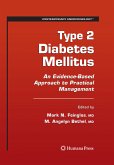Literature Review from the year 2017 in the subject Medicine - Internal Medicine, grade: C, , language: English, abstract: Dementia is a multifaceted syndrome with a significant public health, social, and economic burden; there are forty-four million people affected by the disease worldwide according to the most recent estimate.The number is projected to double by the year 2030 and to triple by 2050. Alzheimer's disease (AD, or type-3 diabetes mellitus) and vascular dementia are the most common forms of dementia. Lifestyle risk factors including obesity and type 2 diabetes increase the risk for the development of both vascular and nonvascular dementia in later life. Previous literature reported that people with diabetes mellitus had 70% greater risk for dementia development.Traditionally, type-2 diabetes and AD (type-3 diabetes) have been thought as independent disorders; recent literature suggests possible links that could lead to common effective modalities of treatment. Furthermore, the highly innervated pancreas shares many features with the brain at molecular levels. Metformin is recommended as the first line for the treatment of patients with type 2 diabetes mellitus due to its effectiveness, favorable effects on lipids and cardiovascular risks, and safety profile.The previous restriction of the use of metformin in patients with the moderate renal disease is loosened by the Food and Drug Organization(5,6). Thus the use of this valuable and affordable drug is expected to increase. The American Diabetes Association recommended the periodic measurement of vitamin B12 and supplementation as needed to reflect the recent evidence showing the association of long-term use of metformin and B12 deficiency.Although the role of vitamin B12 deficiency in the development of dementia is well-established, the role of metformin in B12 deficiency and dementia remain to be elucidated. Insulin resistance is considered as a primary factor for the association of diabetes mellitus and dementia. However, the role of insulin sensitizer in the prevention of dementia remains unclear.Furthermore, there is an increasing concern about the role of metformin in cognitive disorders.Thus we conducted this narrative review, in this study we reviewed the literature to assess the interaction of Alzheimer's disease, the gut, and its microbiome, and to assess the role of metformin and other drugs used for type 1&2 diabetes mellitus as possible therapies for the AD. The role of microbiota and fecal transplantation on cognitive disorders was also discussed.
Dieser Download kann aus rechtlichen Gründen nur mit Rechnungsadresse in A, B, BG, CY, CZ, D, DK, EW, E, FIN, F, GR, HR, H, IRL, I, LT, L, LR, M, NL, PL, P, R, S, SLO, SK ausgeliefert werden.









